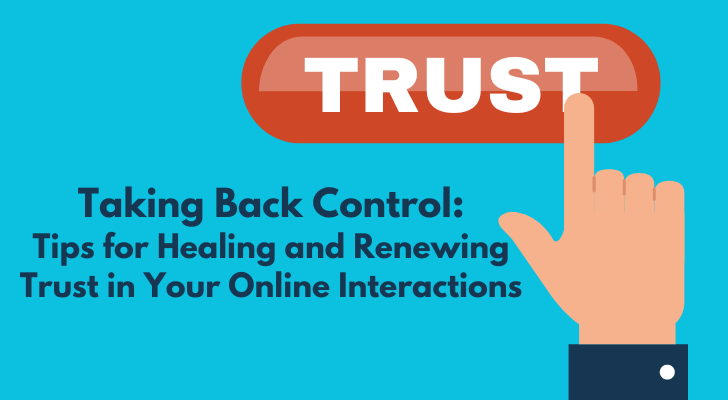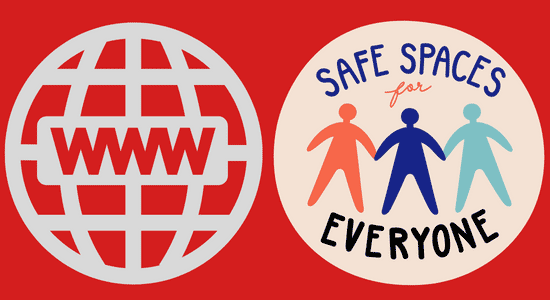The internet is an anonymous space where anyone can go and access information, and that's a scary thing. You don't know who is on the other side of any service online. We’d all better be mindful of this fact when interacting with people online - they may not have your best interests at heart, so trust should never be assumed.
Similarly, others don't necessarily trust you either. So you should exercise caution and good judgement in all interactions online and take steps to protect yourself by using secure passwords and staying aware of potential scams or malicious activity.
Trust can be fragile in online interactions, especially when it comes to more serious issues; cyberattacks and data breaches seem all too common. That's why we all need to take back control of our online experiences by healing and renewing trust in ourselves, each other, and the technology we use every day. So I will give you some tips for doing just that – Let's get started, shall we?

Did You Know?
- Data Breach Concerns: 78% of internet users express concern over the privacy and security of their personal information online.
- Phishing Attacks: Each year, approximately 30% of users receive phishing emails, undermining trust in digital communications.
- Trust in Social Media: Only 20% of users fully trust the content they see on social media platforms.
- E-commerce Trust Issues: 60% of online shoppers report hesitation in purchasing from unfamiliar websites due to trust concerns.
- Recovery from Breaches: After a data breach, companies can lose up to 65% of trust from their customers.
The Importance of Trust in Our Online Lives
We all know we should really be discerning about what we believe and share, right? But sadly, there are many forces at work online that seek to exploit our trust for their own gain. But we can fight back by being more mindful of the sources of our information and taking steps to protect our online lives from manipulation and deception.
Here are some tips for healing and renewing trust in your online interactions:
- Be selective about what you share. Before hitting the “share” button, take a moment to consider the source of the information, and if it's reliable and trustworthy.
- Research suspicious sources before believing or sharing anything they say. Conduct your own investigation using a variety of reliable sources to help ensure accuracy and avoid spreading misinformation.
- Make sure your accounts are secure. Use strong passwords, and two-factor authentication, and regularly update your privacy settings to protect yourself from online scams and data theft.
- Be aware of identity theft. Keep an eye out for any suspicious activity on your accounts that could be signs of someone trying to steal your identity or access your personal data.
- Take control of conversations. Don't be afraid to call out false or misleading information when you see it, but do so with respect and kindness – no one wants to feel attacked online!
Take these steps and you can help create a safer online space where trust is restored. Because everyone should feel comfortable participating in the digital world.
The Problem with Social Media
You're scrolling through your social media feed and you see something that doesn't look right. Maybe it's an article with a sensational headline that doesn't quite match the content or a post from a friend that seems out of character. Whatever it is, it makes you stop and wonder: can I really trust what I'm seeing online?
Social media is full of false information, and sadly, many people use it to bully and harass others. The monitoring process isn’t 100% working, and it seems out of control.
On top of that, we all know social media is addicting, and it leads to people spending too much time online, instead of interacting with the people around them.
How to Spot a Fake Website
We hear a lot about extremely professional, genuine websites but they're actually fake nowadays. We need to learn how to spot them so we can avoid being taken advantage of or falling victim to identity theft. Here are some things to look for:
- The website design is poor quality or looks “off” in some way
- There are grammar or spelling errors on the site
- The site is asking for personal information that it shouldn’t need (e.g., your Social Security number)
- You can’t find contact information for the site owner or customer support
- The site is offering something that seems too good to be true (e.g., a free trial without any strings attached)
If you come across a website that raises any red flags, err on the side of caution and don’t interact with it. It’s better to be safe than sorry!
Did You Know?
- Importance of Transparency: 75% of users say transparency from online services regarding data usage significantly increases trust.
- Impact of Reviews: 85% of consumers trust online reviews as much as personal recommendations.
- Password Practices: Poor password security practices contribute to distrust, with 50% of users not changing their passwords regularly.
- Two-Factor Authentication Adoption: Only 40% of users employ two-factor authentication, despite its effectiveness in increasing account security.
- Trust in Online News: Just 32% of people trust news they read online, highlighting skepticism about digital information sources.
Tips for Staying Safe Online

It’s no secret that the internet can be a scary place. With all of the news stories about cyberbullying, identity theft, and other online crimes, it’s easy to understand why so many people are hesitant to engage in online interactions. However, there are a few simple steps you can take to help ensure your safety when interacting with others online:
1. Use strong passwords:
When creating passwords for your online accounts, be sure to use a mix of letters, numbers, and special characters to make them as difficult to guess as possible. Avoid using easily guessed words like “pa55word” or your name +1 (e.g. “Stephen1”).
2. Don’t share personal information:
Be cautious about what personal information you share online. This includes things like your home address, phone number, email address, birth date, etc. Only share this type of information with people you know and trust.
3. Keep your software up-to-date:
One way hackers gain access to people’s accounts is by taking advantage of outdated software. Be sure to keep all of the software on your computer and mobile devices up-to-date in order to help protect yourself from these types of attacks.
4. Be aware of phishing scams:
Phishing scams are emails or websites that pose as legitimate businesses in an attempt to steal your personal information. If you receive an email or visit a website that looks suspicious, do not respond to any requests for personal information.
5. Don’t open suspicious attachments:
Many viruses and malware programs are spread through email attachments. If you receive an email with an attachment from someone you don’t know, don’t open it.
These steps will hopefully allow you to ensure your safety while engaging in online interactions. Remember to always be aware of your surroundings and take the necessary steps to protect yourself while online.
Did You Know?
- Fraudulent Accounts: Approximately 10% of social media accounts are fraudulent, affecting user trust in online interactions.
- Effectiveness of Encryption: 70% of tech-savvy users feel more secure when using encrypted messaging apps.
- Trust Restoration Efforts: Companies that take immediate action post-data breach can restore up to 60% of lost trust within a year.
- Cybersecurity Investments: Businesses that invest in robust cybersecurity measures see a 55% improvement in consumer trust.
- Importance of Brand Reputation: 90% of users say that a strong, positive online reputation makes them trust a business more.
Regaining Trust That You've Lost
If you have lost the trust of your audience by mistake, it is important to acknowledge the issue and take steps to rectify the situation.
Admit Your Mistake
Start by apologizing for any missteps that may have caused distrust among your followers and explain what you are doing to prevent similar mistakes in the future.
Showing an understanding of why trust was broken, taking ownership of your errors, and demonstrating a commitment to improving will help restore relationships with those affected.
Be Transparent
From now on, be honest and transparent with your audience about the nature of your business. Honesty builds trust between you and your audience, which can lead to long-term relationships. Transparent communication also helps create a sense of security for potential buyers as they know exactly what they are getting from your business.
Being open and providing accurate information will help set realistic expectations for both you and those engaging with your business, leading to positive outcomes in the long term.
Additionally, it is essential to remain transparent about any changes or new processes implemented as a result of the incident so that audiences know their feedback is being taken seriously.
Use of a Fake Name Online

Using a fake name can be a good way to protect your identity and keep yourself safe, but you should remember that nobody will trust you if you are not being honest about who you are.
It is better to use your "known name" - either your real name or nickname but stick with it - in situations where people need to be able to trust the information they receive from you.
If someone has any reason to doubt your credibility due to the fact that you have used a false identity, this could cause them significant problems and make it difficult for them to believe anything else that you claim. In short, if honesty is important, then you wouldn't pretend to be someone else.
Renewing Trust After an Online Betrayal
When you've been the victim of an online betrayal, it can be hard to trust again. You may feel like you can't trust anyone, and that everyone is out to get you. However, there are steps you can take to heal and renew trust in your online interactions.
- Take some time for yourself. This is not the time to be interacting with others online. Spend time offline doing things that make you happy and help you relax. This will help you to clear your head and start fresh.
- Reach out to someone you trust offline. Talk to them about what happened, what you’ve done about it and how you're feeling now. This will help you to process your feelings and start to see things from a different perspective.
- Slowly start interacting with people online again. Begin with people you already know and trust offline. As you build up trust again, you'll be able to interact with more people online.
You can certainly begin to rebuild your trust in other people and begin to engage in more meaningful interactions over time.
Did You Know?
- Digital Identity Verification: 65% of users feel more confident in platforms that require identity verification for profiles.
- Impact of Secure Payment Options: Offering secure payment options increases customer trust in e-commerce platforms by 80%.
- Privacy Policy Awareness: Only 25% of internet users regularly read privacy policies, yet those who do express higher levels of trust.
- Online Interaction Reluctance: 45% of users admit to avoiding certain types of online interactions due to trust issues.
- Education on Online Safety: Providing education about online safety can increase user trust in digital platforms by 35%.
- Return on Security Investment: For every dollar spent on improving online security, companies see an average return of $2.50 in increased trust and engagement.
Steps To Take To Heal And Renew Trust
Now, let's look at the trust issue the other way round.
When your trust has been violated online, it can be difficult to know how to move forward. You may feel like you can't trust anyone or that you're always going to be the victim of some sort of scam. But it is possible to heal and renew trust in your online interactions. Here are some steps to take:
- Acknowledge what happened. you should first acknowledge what happened and how it made you feel. You will be able to begin the healing process this way.
- Forgive yourself. Forgive yourself for any role you may have played in the situation. Whether it was being naive or not being aware of red flags, forgive yourself and move on.
- Don't dwell on the past. Once you've acknowledged what happened and forgiven yourself, it's time to move on and focus on the present. Dwelling on the past will only keep you stuck and make it harder to trust again in the future.
- Take precautions in the future. When you're ready, start taking precautions in the future to avoid getting scammed again. This may include being more selective about who you interact with online, doing more research before trusting someone and setting boundaries in your relationships.
- Rely on pros if needed. If you're finding it difficult to heal and move on from what happened, don’t hesitate to ask a professional such as a therapist or counselor who can assist you in working through your emotions and rebuilding trust.
You can start to heal as you take these steps and will eventually move on from what happened. Trust is an important part of any relationship, so take the time to take care of yourself and rebuild your trust in others.
Interact with Caution Online
Treat others online with respect, whether it's a business relationship or personal. But you should never believe what they say. That's the bottom line of virtual engagement.
1. Be aware of your own triggers and buttons.
When you are feeling reactive, take a step back and try to understand what is really going on for you. This will help you to stay in control of your reactions.
2. Try to be as understanding as possible with others.
Everyone has different triggers and buttons, and it can be easy to accidentally push them. If you can try to see things from the other person's perspective, it will help diffuse any potential conflict.
3. Don’t take things personally.
If someone does push your buttons, don't take it personally. It is not about you, it is about them and their own issues. Again, try to see things from their perspective and respond accordingly.
4. Keep communication channels open.
If there is a misunderstanding or conflict, talk about it openly and honestly. This will help to resolve any issues and restore trust.
What To Do When You're Feeling Triggered
When you're feeling triggered, i.e. emotionally distressed, take a step back and assess the situation.
When it comes to the internet, things can be said that can cause us to feel many different emotions. Whether it's a comment on a post we've made, or something someone else has said about us online - words have power and can make an impact on how we feel.

If you are feeling upset because of something someone said online, take the time to reflect and ask yourself if there is anything specific that was said that is causing these feelings. This will help you understand why this person's words had such an effect on your mental state and allow you to take any necessary steps towards making sure similar situations won't occur in the future.
Also, remember that you always have a choice in how you react to things. You can choose to let the triggering comment or situation online control you, or you can choose to take back control and respond in a way that is healthy for you.
If you find yourself feeling triggered frequently, it may be a sign that there is some unresolved trauma in your past. If this is the case, you should seek professional help so that you can work through these issues and heal.
Stay As a Trustworthy Online Business Owner
As an online business owner, there is only so much you can do to keep your brand safe. You are not invincible. The least you can do is remain trustworthy and reliable in order to build a successful business.
While it may be tempting to take shortcuts or cut corners in order to increase profits, this can ultimately backfire and damage the reputation of your business.
It starts with small things like delivering what you promise on time, always giving honest feedback or advice when asked and making sure your customers know they can rely on you.
Establish yourself as a reliable source and put users’ needs first, and you should be able to foster strong relationships with them which can lead to more success down the road. So remember, if you want your online business to thrive then staying trustworthy should be one of your top priorities!
This hidden knowledge used by the elites will let you generate wealth and prosperity

Taking Back Control: Tips for Healing and Renewing Trust in Your Online Interactions: Wrapping Up
Taking back control of our online interactions is essential to ensure that we use the internet safely and responsibly. By following these tips, you can start to heal from any past negative experiences and build trust as you move forward with your online activities.
With a bit of effort and dedication, you can regain control over how your digital self interacts with the world around them so that it’s in line with your values, beliefs, and overall vision for yourself. Take it one step at a time; slowly but surely, you will form healthy habits that will help guide you through this ever-changing landscape we call the internet.

This is a great article, thank you, I almost scammed some people without knowing because I was a beginner and my coach warned me not to do it exactly the same way you are warning, and told me to take back control with some tips. I am trying to rebuild my reputation on social media but it’s so hard.